
Cancer Drug Resistance
Scope & Guideline
Empowering Research to Conquer Cancer's Resistance Challenges.
Introduction
Aims and Scopes
- Mechanisms of Drug Resistance:
The journal extensively covers the various biological and molecular mechanisms that cancer cells employ to evade the effects of anticancer drugs, including genetic mutations, alterations in drug transporters, and changes in metabolic pathways. - Therapeutic Strategies:
It emphasizes innovative therapeutic strategies aimed at overcoming drug resistance, including combination therapies, targeted therapies, and the use of novel drug delivery systems. - Biomarkers and Predictive Factors:
Research published in this journal often explores potential biomarkers that can predict therapeutic response or resistance, thereby aiding in personalized medicine approaches. - Role of Cancer Stem Cells:
The journal highlights the significance of cancer stem cells in drug resistance, exploring how these cells contribute to treatment failure and disease recurrence. - Emerging Technologies and Models:
It discusses new technologies and experimental models used to study drug resistance, including in vitro and in vivo systems that can mimic the tumor microenvironment.
Trending and Emerging
- Immunotherapy Resistance:
There is an increasing emphasis on understanding the mechanisms of resistance to immunotherapy, particularly immune checkpoint inhibitors, as these therapies are becoming more prevalent in cancer treatment. - Role of Non-Coding RNAs:
Research on non-coding RNAs, including circular RNAs and microRNAs, in drug resistance has surged, highlighting their potential as biomarkers and therapeutic targets. - Nanomedicine and Drug Delivery Systems:
The exploration of advanced nanomedicine strategies to overcome drug resistance has gained momentum, with a focus on improving the delivery and efficacy of anticancer agents. - Metabolic Reprogramming:
Studies on metabolic reprogramming in cancer cells as a mechanism of resistance are trending, reflecting a growing understanding of how metabolic pathways can influence treatment outcomes. - Extracellular Vesicles and Intercellular Communication:
Research into the role of extracellular vesicles in mediating drug resistance and intercellular communication within the tumor microenvironment is emerging as a significant area of interest.
Declining or Waning
- Traditional Chemotherapy Resistance Mechanisms:
Research on traditional chemotherapy resistance mechanisms, such as those related to classic cytotoxic agents, has been less prominent in recent publications, as the focus shifts toward targeted therapies and immunotherapy. - Single-Agent Therapeutic Approaches:
There appears to be a waning interest in studies focusing solely on single-agent therapies, as the field moves towards combination therapies that address multiple resistance mechanisms simultaneously. - Basic Research without Clinical Relevance:
Papers that delve into basic research without direct clinical implications or translational potential have become less frequent, as there is a stronger emphasis on studies that can directly inform clinical practice.
Similar Journals
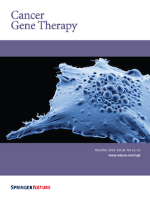
CANCER GENE THERAPY
Innovating Genetic Solutions for OncologyCancer Gene Therapy, published by SpringerNature, stands at the forefront of research in the fields of cancer research, molecular biology, and molecular medicine. With a robust impact factor reflecting its significant influence—ranking in the Q2 category for cancer research and Q1 for both molecular biology and molecular medicine—it serves as an essential resource for scholars and practitioners alike. Since its inception in 1994, the journal has dedicated itself to advancing the understanding and therapeutic application of genetic innovations in oncology. Notably, it holds distinguished Scopus ranks, placing it among the top tier journals in its categories, underscoring its importance to the scientific community. While open access options are not available, the compelling research published here offers invaluable insights into the latest advancements and strategies in cancer therapy. Engaging with *Cancer Gene Therapy* not only keeps professionals informed but also inspires future innovations in the quest for effective cancer treatments.
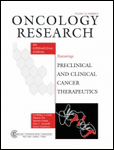
ONCOLOGY RESEARCH
Fostering Excellence in Oncology Research and PracticeONCOLOGY RESEARCH, published by TECH SCIENCE PRESS, is a vital academic journal dedicated to the rapidly evolving field of oncology. With its ISSN 0965-0407 and E-ISSN 1555-3906, the journal serves as a key resource for researchers, clinicians, and academicians committed to advancing cancer research and treatment strategies. Operating without an Open Access model, ONCOLOGY RESEARCH provides high-quality, peer-reviewed articles that cover diverse topics within cancer research, medicine, and oncology, with its 2023 Scopus ranking placing it in the Q3 quartile. The journal's commitment to facilitating rigorous scientific discourse is evident in its historical breadth, with a publishing history dating back to 1992. ONCOLOGY RESEARCH is not only significant for the academic community but also plays a critical role in fostering new insights and approaches in the fight against cancer, making it a must-read for those involved in this critical area of study.
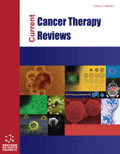
Current Cancer Therapy Reviews
Transforming cancer care through innovative reviews.Current Cancer Therapy Reviews, an esteemed journal published by Bentham Science Publishers Ltd, serves as a critical resource in the fields of cancer research, molecular medicine, and oncology. With an ISSN of 1573-3947 and an E-ISSN of 1875-6301, this journal provides a platform for the rapid dissemination of reviews that articulate the latest advancements and therapeutic strategies in cancer treatment. Although it currently holds a Q4 classification in its respective categories, the journal's commitment to quality scholarship is evident in its engagement with an expansive range of topics impacting cancer care. Operating from the United Arab Emirates since its inception in 2006, it is an essential tool for researchers, clinicians, and students aiming to stay abreast of the evolving landscape of cancer therapy. The journal emphasizes open access to knowledge, fostering a collaborative environment for innovative research. For those looking to deepen their understanding of contemporary cancer therapies, Current Cancer Therapy Reviews is a valuable addition to their academic resources.

CELLULAR ONCOLOGY
Fostering Global Collaboration in Oncological ScienceCELLULAR ONCOLOGY is an esteemed open access journal published by SPRINGER since 2004, specializing in the dynamic field of oncological research. With its ISSN 2211-3428 and E-ISSN 2211-3436, this journal plays a pivotal role in disseminating cutting-edge findings and innovative methodologies that address cancer at the cellular level. The journal has consistently achieved high-impact recognition, currently holding a Q2 rating in Cancer Research and Q1 rankings in Medicine (miscellaneous), Molecular Medicine, and Oncology as of 2023. Furthermore, it ranks 56th in oncology medicine and 48th in cancer research according to Scopus, placing it firmly within the top echelons of its field. Published in the Netherlands, with an aim to connect scientists, clinicians, and practitioners worldwide, CELLULAR ONCOLOGY fosters a collaborative environment for researchers to share insights, enhance understanding, and advance treatments. The journal’s open access model ensures that ground-breaking research is freely available, facilitating greater visibility and impact within the scientific community and beyond.

CANCER CHEMOTHERAPY AND PHARMACOLOGY
Empowering researchers with high-impact studies in chemotherapy.Cancer Chemotherapy and Pharmacology, published by Springer, is a leading peer-reviewed journal that plays a crucial role in the field of cancer research and drug therapy. With an ISSN of 0344-5704 and an E-ISSN of 1432-0843, this journal has been a cornerstone of oncology and pharmacology research since its inception in 1978, with continued relevance through to 2024. The journal holds a commendable Q2 ranking in categories such as Cancer Research, Oncology, and Pharmacology (medical), while achieving an elite Q1 status in Toxicology, reflecting its high-impact contributions to the scientific community. Researchers and professionals benefit from access to cutting-edge studies, insightful reviews, and innovative methodologies, making it a vital resource for anyone working at the intersection of pharmacology and oncology. Although not an open-access journal, Cancer Chemotherapy and Pharmacology remains highly accessible through institutional subscriptions, ensuring it reaches a broad audience dedicated to advancing cancer treatment and patient care.

JOURNAL OF EXPERIMENTAL & CLINICAL CANCER RESEARCH
Advancing cancer research through innovation and collaboration.The JOURNAL OF EXPERIMENTAL & CLINICAL CANCER RESEARCH, published by BMC, is a leading open-access journal dedicated to advancing the field of cancer research and oncology. Since its inception in 1982, this esteemed journal has fostered innovation and collaboration in the scientific community, as evidenced by its outstanding impact factor and position in the Q1 quartile for both Cancer Research and Oncology categories in 2023. With a proud commitment to disseminating high-quality research, the journal operates under an open-access model, ensuring that findings are readily accessible to researchers, healthcare professionals, and students worldwide. The journal has established a distinguished reputation, ranking 23rd out of 404 in Medicine oncology and 16th out of 230 in Biochemistry, Genetics, and Molecular Biology (cancer research), showcasing its importance and influence in guiding the future of cancer treatment and research. With the aim of bridging experimental and clinical research, this journal invites submissions that push the boundaries of our understanding of cancer biology and therapy.

Cancer Research Communications
Empowering global collaboration in cancer research.Cancer Research Communications is an esteemed journal published by the American Association for Cancer Research, a leading organization in the field of oncology. This journal aims to advance knowledge in cancer research through the dissemination of high-quality, peer-reviewed articles that cover a wide range of topics related to cancer biology, treatment modalities, and prevention strategies. As an open-access journal, Cancer Research Communications ensures that vital research findings are accessible to a global audience, promoting collaboration and innovation within the scientific community. The journal serves as a crucial platform for researchers, professionals, and students to share their insights and foster the exchange of effective cancer therapies and methodologies. With a commitment to excellence, it plays a significant role in shaping the future of cancer research and therapeutic development.
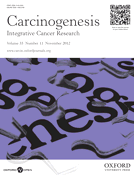
CARCINOGENESIS
Exploring Innovations in Cancer Treatment and ResearchCARCINOGENESIS, published by Oxford University Press, is a premier journal dedicated to the nuanced field of cancer research. With an ISSN of 0143-3334 and an E-ISSN of 1460-2180, this esteemed journal plays a crucial role in disseminating high-quality research findings since its inception in 1980, making it a cornerstone in the exploration of carcinogenic processes. As of 2023, it stands out with a commendable Q2 ranking in Cancer Research and a Q1 ranking in Medicine (miscellaneous), reflecting its significant impact in advancing knowledge in these vital areas. Supported by a strong Scopus ranking, specifically holding the 61st position out of 230 in Biochemistry, Genetics, and Molecular Biology within Cancer Research, CARCINOGENESIS provides researchers, healthcare professionals, and students access to peer-reviewed articles that cover a broad spectrum of topics related to cancer etiology, prevention, and treatment. Although it is not an open-access journal, its commitment to excellence ensures that every published article contributes meaningfully to the global fight against cancer, making it an essential resource for those engaged in cutting-edge cancer research.
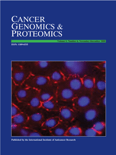
Cancer Genomics & Proteomics
Pioneering discoveries in cancer genomics and proteomics.Cancer Genomics & Proteomics is a pivotal journal published by the International Institute of Anticancer Research, dedicated to advancing the fields of cancer genomics and proteomics. Established in 2004 and running until 2024, this journal provides a vital platform for the dissemination of high-quality research that explores genetic and protein interactions in cancer, thereby fostering innovations in diagnostics and therapeutics. The journal boasts a commendable Q2 ranking in Biochemistry and Genetics and is recognized in the Q3 tier for its contributions to Cancer Research and Molecular Biology, reflecting its growing impact in these dynamic fields. Operating out of Greece, it engages a diverse audience, including researchers, clinicians, and students, by sharing significant findings and methodological advancements in the realm of cancer studies. While currently not an open-access publication, Cancer Genomics & Proteomics remains committed to enriching scientific dialogue and collaboration with its insightful articles and reviews.

BIOCHIMICA ET BIOPHYSICA ACTA-REVIEWS ON CANCER
Pioneering Insights in Oncology and GeneticsBIOCHIMICA ET BIOPHYSICA ACTA-REVIEWS ON CANCER, published by Elsevier, has established itself as a leading journal in the domains of cancer research, genetics, and oncology, holding a prestigious position in the Q1 quartile rankings in these fields as of 2023. With an ISSN of 0304-419X and an E-ISSN of 1879-2561, this journal aims to disseminate high-quality, impactful reviews that synthesize the latest advancements and findings in cancer biology, treatment modalities, and genomic studies. Its robust indexing and remarkable Scopus rankings—placing it in the 95th to 91st percentiles across various categories—underline its significance for researchers, clinicians, and students passionate about oncology. Operating from its Netherlands headquarters, BIOCHIMICA ET BIOPHYSICA ACTA-REVIEWS ON CANCER is dedicated to fostering a comprehensive understanding of the complex biological mechanisms underlying cancer, promoting innovative therapeutic strategies, and guiding future research directions.